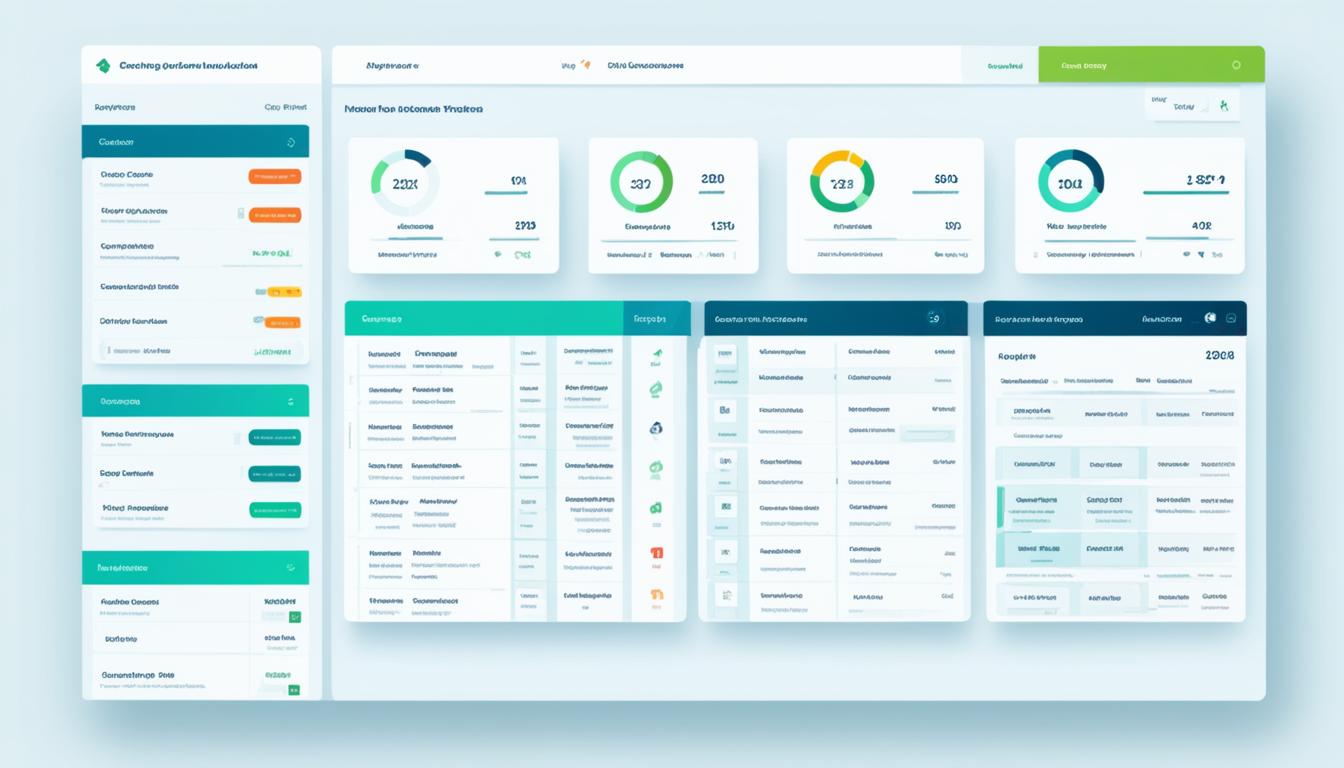The integration of property management software into the real estate business has become a game-changer for technical property managers. With the industry poised for substantial growth, these sophisticated platforms offer a suite of features designed to address complex management tasks efficiently. From centralizing data for easy access to streamlining communication channels, property management software for properties is becoming an essential component in the toolkit of successful property managers.
Through detailed property management software comparisons, professionals in the field can identify the top property management tools that offer not just a boost in productivity but also an enhanced accuracy in tracking performance metrics and financial management. Key Performance Indicators (KPIs) are more readily surveilled, ensuring property managers can stay ahead in a competitive market.
Amidst the plethora of options available, it can be challenging to sift through and pick the best property management tools. However, by focusing on solutions that cater to the unique needs of real estate management—such as maintenance coordination, accounting, and reporting—technical property managers can secure a system that saves time and capitalizes on growth opportunities.
Key Takeaways
- Choosing the right property management software is vital for optimizing real estate management.
- Efficient data centralization and management are key for strategic decision-making.
- Identifying top property management tools enables technical managers to leverage technology for growth.
- Comparisons of property management software are essential for finding a platform that fits specific management needs.
- Integrating property management software into daily operations assists in KPI tracking and financial monitoring.
- Property management software ensures comprehensive solutions for properties.
Introduction to Property Management Software
The real estate industry is ever-evolving, and with the adaptability that comes from harnessing the power of the best property management software, property managers of commercial properties can revolutionize their workflow. A meticulous selection of property management software integrations permits a seamless experience, transitioning from disparate systems into an interconnected ecosystem, adept at managing various facets of operations. With an increase in efficiency, this technology also spawns fertile grounds for real estate businesses to flourish in a competitive market.
Among the pantheon of software tools, those that prioritize user efficiency have garnered glowing property management software reviews. These platforms are not only capable but also essential for the automation of repetitive managerial tasks, freeing managers to focus on growth strategies and building client relationships. They offer valuable features such as secure cloud-data management options, and they robustly protect sensitive data while ensuring it is conveniently accessible to authorized personnel. Below are some of the pivotal advantages that exemplary property management software offers:
- CRM software integration for enhanced client relationships and lead management
- Efficient payment processing systems that manage and track tenant payments
- Rigorous data security measures to safeguard owner and tenant information
- Cloud-based infrastructure supporting remote access to data management tools
The integration capabilities open doors to other essential real estate management systems, such as CRM platforms, thereby creating a comprehensive and coalescent managerial experience. It’s these kinds of software synergies that underscore the importance of property management software in today’s demanding real estate landscape.
| Feature | Benefit | Integration Example |
|---|---|---|
| Automated Task Management | Streamlines operations and reduces manual labor | Integration with task scheduling tools |
| Payment Processing | Quick and secure financial transactions | Integration with accounting software |
| Data Management and Security | Centralized data storage with high-level security protocols | Integration with data encryption services |
| Cloud-based Services | Remote access and data backup | Integration with cloud storage platforms |
To recapitulate, the incorporation of proficient property management software is not a mere upgrade; it is a pivotal move towards optimizing the management of real estate portfolios. Providing an invaluable edge, this technology stands at the vanguard of modern real estate management, underpinned by integrations that push the boundaries of traditional practices.
Embracing Digital Transformation in Real Estate
As the real estate industry marches towards digital excellence, the adaptation of cloud-based property management software is not just an advantage—it’s a necessity. These sophisticated platforms equip property management professionals with powerful tools to enhance tenant satisfaction, optimize workflows, and secure data with ease. As technical property managers integrate these top property management tools, they experience a significant shift toward efficient, centralized, and responsive operations. The digital transformation journey in real estate is marked by a commitment to excellence, ensuring responsiveness to both market trends and client needs.
Property management software pricing models vary, catering to diverse business sizes and objectives. Making an informed choice requires an understanding of how these systems can streamline operations, reduce overhead costs, and facilitate communication channels. Transparency in pricing, combined with robust functionality, aligns with the financial strategies of astute real estate businesses, positioning them for growth and success.
Below is an overview of the primary benefits achieved by integrating digital tools within the real estate sector:
- Streamlined communication between landlords, tenants, and management
- Automated rent collection and financial oversight
- Efficient property and tenant management
- Enhanced decision-making through comprehensive reporting modules
Let’s consider a comparative look into the essential features offered by these transformative digital tools.
| Feature | Benefit |
|---|---|
| Cloud Infrastructure | Provides remote access to property data, ensuring management can operate from anywhere, anytime. |
| Scalable Pricing Models | Allows real estate businesses to choose a plan that aligns with their property portfolio, reducing initial costs and scaling as they grow. |
| CRM Integration | Facilitates relationship management and streamlines communication channels for better tenant engagement. |
| Automated Workflows | Reduces manual workload and improves operational efficiency and accuracy in handling routine tasks. |
| Data Security | Ensures sensitive information is safeguarded with advanced encryption and security protocols. |
The transition to cloud-based property management software marks a milestone for the real estate sector, creating a more agile business environment that thrives on innovation and continuous improvement. As the market evolves, those who leverage top property management tools with savvy property management software pricing strategies will cement their position at the forefront of the industry.
Centralization of Property Data
The overarching goal for any effective real estate management system is the consolidation and centralization of critical data. Navigating through the complexities of property management requires a robust framework that prioritizes organization and simplified access to vast amounts of information. A comprehensive examination of property management software features underscores the value of having a unified platform that securely houses client and property details. This centralization is not just a convenience but a strategic imperative that enhances decision-making and operational coherence across teams.
Comparing the best property management software available on the market reveals a shared commitment to providing centralized databases. This feature streamlines the workflow for technical property managers, ensuring that essential data is consistently accessible and protected. As asset managers move towards a more data-driven approach, the efficient management of information becomes fundamental. The central repository feature is a cornerstone of property management software comparisons, emphasizing its integral role in maintaining a competitive edge in real estate management.
Aligning with this objective, property management software converges all relevant data into a single location. This becomes especially valuable when assessing property management software features, as it diminishes the risk of fragmented or inconsistent data handling. In enabling informed strategy decisions, well-organized property data aligns perfectly with the goals of technical property managers and technical asset managers. It is a precursor to achieving high scalability and agility in a dynamic market.
It’s also worth considering how different segments within the sector utilize these centralized systems. While technical property managers are engrossed in the operational details, technical asset managers leverage the data to meet the financial aspirations of stakeholders. Centralized data repositories in property management software grant both parties the clarity and readiness required to navigate their distinct responsibilities effectively.
Centralizing property and client data through the best property management software yields numerous benefits. It assures a fortified security protocol for sensitive information, fostering trust between managers and their clients. Moreover, the utility of on-demand data retrieval not only augments operational efficiency but also acts as a safeguard against potential business loss. Utilizing a tailored, feature-rich PMS can make the arduous tasks associated with real estate management both manageable and proficient.
- Simplified access for cohesive team collaboration
- Enhanced security for client and property data integrity
- Strategic advantage through informed decision-making
- Operational efficiency for technical managers and asset managers
Ultimately, in property management software comparisons, the merits of centralization stand out as a discerning factor. Armed with cohesive and comprehensive data, real estate professionals are better positioned to meet the evolving demands of managing modern properties. The best property management software organically enhances the operations of property and asset managers without them assuming property ownership, thereby preserving the integrity of client-focused service delivery.
Automation of Daily Operations
The role of property management software integrations in modern real estate management cannot be overstated. These digital tools have been game-changers, particularly by automating the myriad of daily tasks that property managers face with property management software. From tracking rent payments to generating financial reports, automation is reshaping the industry by improving accuracy and freeing up valuable time.
Consider the tedious task of financial record-keeping; it’s now simplified with the implementation of sophisticated property management software. These systems bring a level of precision to the management of payment balances that manual processes could never achieve. Consistency and reliability in data management uphold the integrity of a property manager’s work, securing their reputation among clients and stakeholders alike.
Another layer of functionality emerges when looking at property management software reviews. Users frequently highlight the software’s ability to streamline report creation. What once took hours, now takes minutes, with automated systems effortlessly collating data to produce comprehensive reports. This radical improvement in productivity simultaneously diminishes the risk of human error, ensuring that reports are both timely and accurate.
Through the effective use of property management software, operational efficiency is greatly enhanced, enabling property managers to focus on more strategic tasks. Let’s delve into some of the key operations positively impacted by automation:
- Payment Processing: Scheduled reminders for rent collection and automated late fee calculations.
- Tenant Screening: Automated background and credit checks for potential tenants.
- Maintenance Requests: Notification systems for new maintenance issues and status updates on ongoing work.
- Communication: Auto-response features for common tenants inquiries and streamlined communication channels.
| Operation | Manual Process | Automated Process |
|---|---|---|
| Rent Tracking | Manual ledger entries and calculations | Automatic recording and balance updates |
| Financial Reporting | Data compilation from various sources | One-click report generation |
| Maintenance Management | Disjointed communication and tracking | Centralized ticketing system |
| Vendor Payment | Manual invoicing and checks | Electronic payments and record tracking |
As evident from the comparison, automation not only optimizes operational tasks but also substantially elevates the property management experience for both managers and tenants. Therefore, the move towards integrating property management software is not just a trend but a cornerstone in building a resilient and future-proof real estate management business.
Financial Management and Reporting
Effective financial management represents the backbone of successful property operations. Understanding this, the best property management software provides comprehensive functions addressing every aspect of financial tracking and reporting. This empowers technical property and asset managers to maintain financial health, satisfy client goals, and stay abreast of current regulations without owning the properties or investments.
Real-Time Financial Tracking
Staying updated with live financial transactions is critical for property management. Advanced tools within top property management tools enable managers to detect and act upon unpaid rents rapidly, shielding the business from potential cash flow problems.
Automated Accounting Workflows
The intricacies of financial processes in real estate can be daunting. To streamline this complexity, property management systems offer automated accounting workflows. These processes are essential in efficiently managing budgets, along with payables and receivables, ensuring the financial wheel keeps turning with minimal human input. Property management software pricing is frequently justified through these streamlined financial operations.
Customizable Financial Reporting
Each real estate firm has unique reporting needs based on its clientele and the regulations it follows. With best property management software, creating customized reports that resonate with the firm’s requirement becomes an easier task. Managers can extract valuable insights and stay compliant with industry standards, all at a few clicks.
| Feature | Benefits |
|---|---|
| Real-Time Tracking | Identify outstanding payments immediately to address cash flow. |
| Automated Workflows | Simplify complex financial tasks, ensuring accuracy and efficiency. |
| Custom Reports | Tailor reports to meet industry standards and extract business insights. |
By understanding the full spectrum of capabilities offered by top property management tools, technical property managers are well-equipped to provide exceptional management services that align with both financial and operational objectives.
Tenant and Lease Tracking
At the core of effective property management, technical property managers understand the critical importance of robust tenant and lease tracking mechanisms. With the dynamic nature of real estate, a comprehensive approach to managing tenant data and lease terms is no small feat. This is where property management software stands out, boasting features that cater to efficiency and accuracy in the often complex arena of lease administration.
Several property management software reviews highlight the necessity of a tool that not only organizes and centralizes tenant information but also eases the lease management process. Customization options are particularly beneficial for technical property managers, as they can tailor the software to meet specific lease agreement needs while automating renewal notifications, thereby ensuring no detail is overlooked.
Through detailed property management software comparisons, it’s evident that the capacity to maintain a detailed database is invaluable. A centralized system enables technical managers to track rental payments meticulously, monitor due dates, and manage lease terms effectively, which in turn contributes to more seamless property operations.
- Organization of lease documents
- Automated alerts for lease renewals and expirations
- Centralized database of tenant contacts and history
- Rental payment tracking and processing
Incorporating these property management software features is integral for not just streamlining daily tasks, but also for enhancing decision-making processes. When property and asset managers are equipped with the right tools to track leases and tenants efficiently, the property’s operational performance is optimized, aligning with both technical management goals and investment objectives.
Streamlined Communication Channels
Effective communication stands at the core of modern property management, and selecting the best property management software is pivotal for establishing a fluid channel between managers and tenants. With the rise of digital communication, it is essential that the chosen platform integrates seamlessly with popular mediums like social media and email, ensuring no request goes unnoticed. This level of property management software integrations makes it easier for tenants to reach out via their preferred methods, improving tenant relations and operational workflows.
Property managers recognize that responsiveness can significantly impact tenant satisfaction. By employing top property management tools, managers can receive and reply to messages on the go, address concerns swiftly, and manage multiple conversations efficiently. Below is a table illustrating how the integration features of property management software can enhance communication strategies.
| Feature | Benefit |
|---|---|
| Email Syncing | Centralized communication leading to quicker, more organized responses. |
| Social Media Integration | Direct engagement with tenants on widely-used platforms. |
| Automated Messaging | Time-saving notifications for rent reminders and maintenance updates. |
| Online Chat Portals | Instant connection and support to handle tenant inquiries in real-time. |
Integrating these communication tools within a property management system not only boosts efficiency but also encourages transparent and continuous interaction. Thus, investment in a robust software solution can be a significant contributor to the overall success of property management operations.
Scalability and Growth Management
For those who manage an expanding portfolio of properties, understanding property management software pricing is only the first step. Selecting cloud-based property management software that scales with your business is essential. As the quantity of properties, users, and tenants you manage grows, so does the complexity of your management tasks. A scalable property management system accommodates this growth smoothly, ensuring that the expansion of your operations does not hinder efficiency.
Among the key considerations for a scalable system is how well it handles the diverse needs of property management software for properties. The ideal software offers an array of detailed, customizable reports that address the unique requirements of your business. Whether you’re managing a handful of units or hundreds, the software should provide insights and data tracking that promote informed decision-making and strategic planning.
| Growth Phase | Users | Tenants | Data Management Requirements |
|---|---|---|---|
| Startup | 1-5 | 1-10 | Basic reporting, Tenant tracking, Lease documentation |
| Expansion | 6-20 | 11-50 | Enhanced analytics, Bulk communication features, Automated lease renewals |
| Established | 21-100+ | 51-200+ | Advanced reporting, Multiple user access levels, Integration capabilities |
| Market Leader | 100+ | 200+ | Custom reporting, API access, Strategic growth tools |
With cloud-based property management software, you not only secure your data but also ensure that your team has remote access to the system, vital for real-time management and agile responsiveness in today’s market. This access is a cornerstone of scalable software, as it allows your team to operate efficiently from anywhere, at any time.
- Sustainable property management software pricing models that adapt as your portfolio grows.
- Modules for property management software that are specially designed for complexity at scale.
- Futuristic cloud-based property management software features that cater to the mobile, modern world.
Opting for a scalable property management solution is not just about managing current needs but laying a foundation for future growth. Your choice today shapes the foundation upon which your property management empire can thrive. Embrace a solution that grows with you, taking your property management to new heights.
Mobility and Remote Management
The landscape of property management is rapidly evolving, with the advent of technologies that cater to a mobile and dynamic workforce. Today’s property managers require tools that transcend the limitations of traditional office-bound systems. Offering solutions that foster efficient management regardless of physical location, cloud-based property management software is at the forefront of this revolution. The incorporation of mobile property management software further empowers property professionals by placing comprehensive management capabilities right at their fingertips.
Cloud-Based Accessibility
Providing the means to access critical data and perform essential management tasks from any location, cloud-based property management software has become a staple for the industry. Data security and availability are inherent benefits, granting peace of mind and continuous productivity to those who operate in the ever-mobile and unpredictable environment of property management.
Mobile Application Integration
In the age where smartphones serve as powerful tools for business administration, mobile property management software not only aligns with the needs of an agile workforce, but it’s also increasingly demanded by clients who seek instant responses and realtime interactions. With dedicated mobile applications, property managers can swiftly respond to tenant inquiries, process transactions, and maintain up-to-date property records, directly from their devices.
| Feature | Cloud-Based Software Advantage | Mobile Software Advantage |
|---|---|---|
| Accessibility | Operate from anywhere with an Internet connection | Management on the go, from any mobile device |
| Data Security | Secure storage options with immediate data recovery | Encrypted data exchange for secure communication |
| User Interface | Customizable dashboards suited for desktop use | Touch-friendly interfaces designed for smaller screens |
| Real-Time Updates | Synchronized data across all platforms | Alerts and notification push directly to mobile devices |
| Collaboration | Multifunctional capabilities for team projects | Easy sharing and communication within teams |
As prospective clients and tenants gravitate towards endeavors that provide ease and efficiency, property management software comparisons play a crucial role in selecting the right tool. The choice may very well dictate the success of meeting modern demands for property management. Concomitantly, for property managers, the adoption of these software solutions is no longer just a matter of convenience; it has become an indispensable component of their operational arsenal.
Property Management Software Features
In an era where efficiency and security are paramount in property management, it’s crucial to leverage property management software features designed to streamline operations and protect valuable data. Advanced tools have transformed how technical property and asset managers conduct business, ensuring they can attend to their responsibilities without the burdens of outdated methods.
Key Features for Efficiency and Security
At the heart of top-rated software lies a suite of integrated features. Notably, hybrid mobile applications provide unparalleled real-time access to business data, empowering managers to make quick, informed decisions. Enhanced with CRM integration, these systems pave the way for strategic growth, capturing crucial tenant interactions and property performance metrics. Moreover, AI-enabled or cloud-based data storage capabilities are fundamental, guaranteeing that sensitive information is safeguarded with the highest levels of security, which is often highlighted in meticulous property management software reviews. These features collectively represent the core of robust property management tools, ensuring that both management and security concerns are adeptly addressed.
Customization and Integration Capabilities
Flexibility remains top of mind for professionals seeking property management software features that align with unique operational needs. Tailoring software through customization options allows managers to cater the user experience to their specific workflows. Further, the ability to seamlessly integrate with other essential software, such as financial management tools like QuickBooks, creates a cohesive ecosystem that enhances productivity. These capabilities do not only resonate within the scope of individual properties but also scale to meet the demands of growing portfolios, demonstrating the adaptability of today’s top property management tools.
Ultimately, the contemporary technical property manager relies on a sophisticated mix of software features and integration capacities that streamline administrative duties, boost data protection, and foster an environment of strategic growth and efficiency. As the software landscape evolves, so too do the capabilities and expectations of the property management industry, underscoring the need for ongoing reviews and assessments to stay ahead of the curve.
Enhancing User Experience and Interface
Recognizing the importance of a seamless user journey, the best property management software platforms are arduously refining their user interfaces. By carefully considering each element of the design, developers are able to mold an experience that’s both functionally superior and aesthetically pleasing.
Intuitive Design for Ease of Use
An intuitive interface in property management software means less time grappling with complex systems and more time allocated to productive property management. Clutter-free dashboards, logical navigation patterns, and clear calls-to-action are the hallmarks of a thoughtfully crafted user experience. These designs help technical property managers perform their duties with enhanced precision and less effort, leading to an efficient management process.
Personalization for Property Managers
Customization takes center stage when it comes to personalizing the property management experience. Property management software integrations allow for a tailored approach to managing a diverse portfolio. Users can modify layouts, create custom fields, and set preferences that resonate with their unique workflows. This level of personalization not only boosts pleasure in daily use but also improves the relevance and effectiveness of the software for each user’s specific needs.
Below we highlight the distinctive features that property managers have found most beneficial in enhancing their software experience:
| Feature | Description | Benefit |
|---|---|---|
| Drag-and-Drop Functionality | Enables quick and easy modification of dashboard elements | Time-saving and improves workflow efficiency |
| Custom Reporting | Creation of personalized reports based on metrics that matter | Access to relevant information, aiding in informed decision-making |
| Theme Customization | Changing color themes to match company branding or personal preference | Improved visual comfort and brand alignment |
| Interactive Tutorials | Guided assistance within the software for learning and exploration | Reduces learning curve and promotes feature adoption |
In conclusion, an outstanding user experience plays a pivotal role in the daily operations of property managers. By selecting a software that emphasizes both intuitive design and deep personalization options, managers can take full control over their digital landscape, thus making the management of properties streamlined and more enjoyable.
Conclusion
In the dynamic landscape of real estate management, the integration of a robust property management software (PMS) stands as an essential component, propelling the industry forward to new heights of productivity and effectiveness. For technical property managers, the implementation of a system that excels in property management efficiency is of paramount importance. The right PMS not only enhances key operational aspects but also serves as a strong foundation for business success.
With the capability to streamline intricate tasks, offer steadfast financial management tools, and provide comprehensive tenant and lease tracking, an adept PMS is an indispensable companion for property managers navigating the demands of today’s market. The added benefits of swift communication, scalability, remote management functionality, and an intuitive user interface cannot be overstated. Each of these facets contribute to a more cohesive and manageable workflow, empowering managers to focus their efforts on strategic growth and client satisfaction.
As we forge ahead in an era where technological advancement is ceaseless, the adoption of a tailored PMS represents not just a choice but a strategic imperative for those intent on distinguishing their service in the competitive field of property management. It is clear that a meticulously selected property management software catalyzes not only operational efficiency but also plays a pivotal role in shaping the technical and commercial success of real estate management enterprises.







